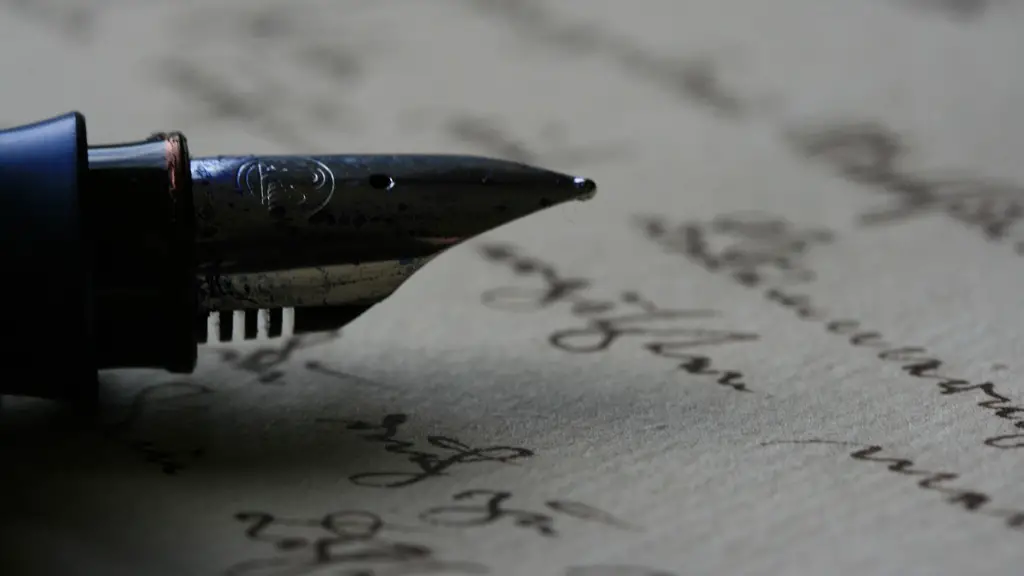Origin of Poetry
Poetry is a creative expression of how one experiences and understands the world. It is typically thought of as a written form of artistic expression, but can also take the form of spoken, rap, visual or mixed-media art. From its origins in ancient times, poetry has been used to capture the intricacies of life, and is even thought to have religious and healing powers. The fundamentals of poetry remain the same – a focus on the beauty and power of language, clever word play, and often emotional intensity.
Writing Quality Poetry
Certain elements of craftsmanship should be kept in mind when writing quality poetry. Writing quality poetry often begins with considering the audience, or reader, of the poem and the emotional atmosphere that may be generated from its writing. Additionally, the length of the lines and the sounds of the words must be carefully chosen. Usage of both rhyme and meter will help reinforce the structure of the piece and create a certain look on the page. Choosing the right words and structuring around line and stanza breaks can also help create an engaging and expressive piece.
Evaluating Poetry
Evaluating a poem can often be a tedious task, especially since one may hear hundreds of voices clamoring to give an opinion on an individual’s work. However, there are a few key points to consider when determining the quality of a poem. When reading, look for the effectiveness of the poem’s imagery, diction, and aesthetic appeal. Additionally, be certain to note the significance of the poem’s message along with its success in producing a unique merging of emotions. To gauge whether or not the poem has achieved a positive quality, ask yourself if the poem resonates with you, or is it able to draw you into a distinct world of its own.
Tips for Writing Quality Poetry
1. Pre-write and brainstorm creative ideas – Before writing, it can help to pre-write and brainstorm ideas that can later be developed into a final poem.
2. Choose a topic or focus – When writing poetry, it is important to consider what topic the poem will address.
3. Structure the poem – Consider the length of the poem, the line length, and the patterning of sounds or images.
4. Proofread and revise – Once the poem is written, it is important to read it aloud to listen for errors and further consider what revisions may help improve the piece.
Benefits of Writing Poetry
Writing poetry can be incredibly beneficial to writers both in terms of mental well-being and creativity. It can be a form of self-expression, often providing therapeutic benefits and the opportunity to express what is often hard to verbalize. Writing poetry can also hone the writer’s imagination and encourage mental clarity, enhancing skills in abstraction, musings, and metacognition. Additionally, writing poetry can provide an opportunity for the writer to contribute to the literary world and expand their appreciation for beautiful language.
The Process of Higher Level Assessment
Once you feel confident that your poem is up to snuff, the next step is to engage in the process of higher-level assessment. To truly evaluate the quality of a poem, one must delve a little deeper and consider how the poem affects one emotionally. Even if the poem contains all the technical elements of strong writing, it needs to resonate with a reader at an emotional level as well. The poem must move the reader and be uniquely memorable in order for it to stand apart from the vast quantities of poetry available today.
Using Resources to Improve
Now that you have a better understanding of how to evaluate the quality of one’s own poetry as well as that of others, you may wish to continue honing your craft. To do this, consider utilizing poetry publications that showcase the work of established and upcoming poets. Additionally, resources such as websites, books, and writing groups can be invaluable tools to help progress your poetry abilities. These resources can provide encouragement, tips, and feedback to refine what you’re already writing as well as provide the opportunity to engage with other poets and gain exposure to different writing styles.
The Significance of Diversity
In our modern world, the importance of inclusivity and diversity has become ever more important. Many of the most well-known and beloved poets can be credited with inspiring a unique audience of fans from different backgrounds and cultures. When evaluating the quality of a poem, be sure to consider how its message may inspire various groups of people differently. Does the poem contain universal truths that will benefit others and create the opportunity for meaningful discussion? These types of questions will help allow you to become a more well-rounded poet.
Being Innovative
Creativity is a cornerstone of writing quality poetry. A good poem will often venture beyond the boundaries of conformity and be uniquely captivating and memorable. Creativity can be enhanced through experimentation and by pushing further into the unknown depths of the creative process. Additionally, consider writing in more than one genre as a way to challenge yourself, as each genre offers a different set of tools to create a successful poem.
What Makes a Quality Poem?
At the end of the day, the quality of a poem may be subjective based on the opinion of the reader, however what remains certain is that quality poetry contains the ability to transport the reader to another world. It should possess the power to make the reader pause and linger in the exquisite scenes and moments that the author has crafted. It should be able to evoke an emotional response, as well as impart something meaningful to the reader. Quality poetry will stand the test of time, haunting the reader and inspiring further creativity.
Conclusion
Poetry is an excellent form of artistic expression, and many of the great poets have continued to inspire people through their beautiful art. Before sharing a poem one has written, it is important to take the time to evaluate its quality and understand the different elements of craftsmanship it may contain. Additionally, utilize resources, such as publications, websites, and writing groups, to review and hone one’s poetry style. Poetry should be creative and inspiring, making the reader feel something special and lasting. Writing quality poetry takes practice, dedication, and an unquenched desire to express one’s creativity – however, when these crucial elements are fulfilled, a truly remarkable poem can be born.


